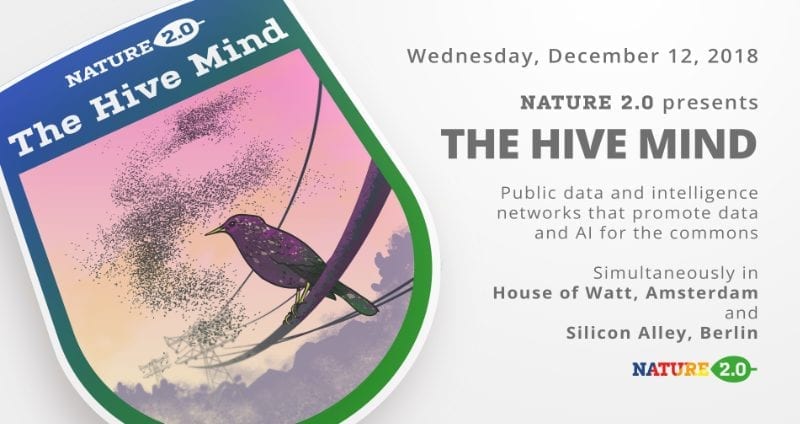Nature 2.0 will hold a series of events in Berlin and Amsterdam, exploring blockchain technology in preparation for their participation as one of the tracks at the biggest blockchain hackaton in the world: the DutchChain Hackaton 2019 in Groningen.
What is Nature 2.0?
Nature 2.0 is an open community who wants to explore the use of cutting-edge technologies in order to create a better society. Taking advantage and combining Artificial Intelligence (AI), blockchain technology and autonomous assets, “Nature 2.0 aims for an ownerless layer of natural resources and intelligent agents that promote sustainable public utilities in a world of abundance”.
In an article on Medium, “Nature 2.0 The Cradle of Civilization Gets an Update”, Trent McConaghy illustrates their mission, inspired by the natural world, were flora and fauna coexist in ecosystems exhibiting features of resilience and anti-fragility, and are based on commons.
Technology allows to replicate the symbiotic relationships presents in nature, and will help design a post-scarcity society, one functioning as a positive-sum game rather than a zero-sum one.
Through the use of AI, Decentralized Autonomous Organizations (DAOs), and autonomous assets, it becomes possible to design Public Utility Networks (PUN) that are self-owned and that self-manage.
Think about self-driving cars: once they become a reality, there would be little use for privates in owning them. It would rather be better to make them autonomous assets, managed by an artificial intelligence, and allow them to receive payments via digital currency.
Nature 2.0 and Universal Basic Income
Cars would then provide an Uber-like service, but there would no drivers to pay, no management, no corporation. It would be a swarm of cars, self-regulating, with no concept of identity or scarcity, and autonomously using part of the payment they receive in order to maintain (repair, upgrade) themselves. And the remaining will be used to finance UBI.
And cars were just one example, the same could work for trucks, electric grids, wind farms, roads, etc. Then the UBI extracted from those redesigned PUNs would be distributed through blockchain, the only requirement proving to be human (an example of blockchain based UBI is that of Manna).
“The abundance from machines gets transferred to humans”
More information at:
Nature 2.0 website
Trent McConaghy, “Nature 2.0 The Cradle of Civilization Gets an Update”, Medium, June 6th, 2018



Buongiorno Daniele,
Leggo troppo tardi il tuo articolo, ma apprezzero’ molto essere informato del prossimo evento di questo tipo per organizzare la simultanea partecipazione del mio gruppo a Tel Aviv; al limite mi bastano due settimane di anticipo per preparare il mio evento, ma un mese e’ sempre meglio.
PF collegati a linkedin.com/in/lightwave – hai su questo sito 47 omonimi ed e’ piu facile per te trovare me, che sono l’unico in mezzo miliardo di utenti della piattaforma.
Ho molto da dirti e cerco il canale adatto.
Auguri di Salute, Longevita’ e Prosperita’ per un 2019 foriero di benessere e Pax Urbi et Orbi,
EGO +972586272388
Dear Eliahu,
Please write in English. This is an English-speaking website.
Thank you,
André
Have you considered how equally including each human in the process and profit of money creation provides the needed funding structure, ethically?
In several years of soliciting argument against, none materialize, in spite of the harsh rebuke, or callous disregard of fellow members of this organisation, and others.
The disregard is for self ownership, in favor of State, which appears as deception, since many if not all arguments for BI involve human rights, and refusing to correct the current inequity supports State ownership of rights to access our labor, if not ownership of our persons, functional ownership.
When State spends money into existence, it issues notes granting bearer right to claim any human labor, or produce of human labor available in the kingdom, as it was with kings, a clear assertion of ownership, paying with other’s labor.
When Bank loans money into existence, borrower gets check, trades for house, who owes what to whom?
Bank has provided only accounting, and charged separately for that.
Borrower clearly owes value of house.
Former homeowner is clearly owed value of house, but has notes. Literally ‘carrying the note’ until it can be exchanged for real value produced by human labor, while bank collects interest. Even when notes are exchanged for labor, another person carries the note, until the note is repaid, and seems to disappear.
The note, the credit, was lifted from our back pocket, and replaced when written off, without our permission or compensation… or knowledge.
Worse still, when State borrows to reconcile money spent, and establish value in foreign exchange, Wealth may borrow money into existence from Bank and purchase sovereign debt at a profit, paying our rightful option fees to Wealth with our taxes.
The simple, constantly rejected correction, is to allow each human to claim an equal Share of the fiat credit money is created from, and borrow money into existence equally from each of us.
Because money is an option to purchase human labor, broadly, and we each equally own the commodity.
Money is currently borrowed into existence through banks. Allowing each human to claim an individual sovereign trust account, each containing only a limited right to loan money into existence, provides the ethical source. So, all money is created by borrowing it into existence from each human, collectively, through our trusts, administered by our chosen local fiduciaries and actuaries exclusively for secure sovereign investment, at a fixed and sustainable rate.
The fixed and sustainable rate then divided equally and distribited to each human in the appropriate currency. A globally consistent BI paid with the sustainable cost of money creation and maintenance, that is constantly rejected by the voluntary administration of this organisation.
If you can imagine an argument against our equal inclusion, or shed light on the refusal to consider, I’d appreciate that very much.
Thanks for your service, and kind indulgence